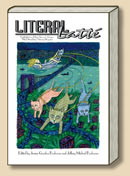From the top, this play is about the poetess Emily Dickinson and her singular life in Amherst, Massachusetts. Below the top, this is a love story about a girl who knows she has no more chance at love. She loved one man and one woman intensely, she said, but they were “bodiless” loves, she added, and by the time of the play both are apparently finished. Words to which she would “take off her hat,” such as circumference (cir-cum-fer-ence!) offered her as much love as any human, and so she wrote with them. The actual poems of Dickinson trickle into the play, a 100 minute monologue.
The Belle of Amherst
The Belle of Amherst
Starring: Joely Richardson
Written by William Luce
Directed by Steve Cosson
Westside Theatre, 407 W. 43rd St.
Tickets: $79
Lines such as “I would eat evanescence slowly” tripped me up, but pleasantly. Emily had read that editors wanted “genius” but she could not figure out what that was. She put the question to Webster — a woman after my own linguist’s heart— but after reading his entry proclaimed that he did not know the meaning, either. She was as full of contradictions as this vegetable burger I’m eating after the show. She was desperately lonely though she never lived alone, but who hasn’t felt this way? When she was 15 she fancied that she might be the belle of the ball of Amherst by the time she was 17, though she knew she was too “plain.” Dickinson allegedly lived with bipolar disorder and the script does a skillful job of balancing her thrills and her sadnesses, in part with cake and rhubarb muffins.
As the only actress in the play, Joely Richardson gave a marvelous performance. One could judge this on the outset by the lines on her face. In the first scene, her countenance was all strained neck lines and prominent crow’s feet around light blue eyes, such that she looked vigorously crazy. Soon after, her forehead had lines, too, and then the parentheses around her mouth joined in the show. Emily was 53 years old in the play, a good age at which to embrace one’s lines.
The play gives a first-person look into the life of a self-proclaimed nobody. It is steeped in cleverness, absurdity and death. Miss Dickinson “[has] often thought how noteless [she] could die,” and says with glee that she wants lilies on her grave. At the end of the play, Emily promises to share a gingerbread recipe with the audience the next time we all get together. I would choose to watch her again in the instant it would take a dead leaf crinkle under a shoe, and I left wishing that people, including myself, read more poetry.

